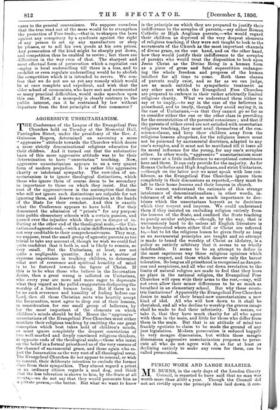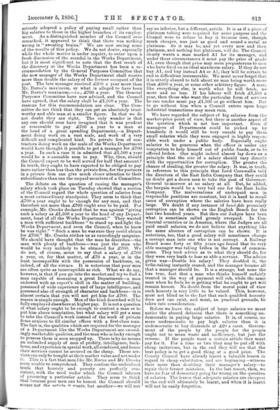PUBLIC WORK AND LARGE SALARIES.
MR. BURNS, in the early days of the London County Council, is reported to have said that no man was worth more than £500 a year. Though the Council did not act rigidly upon the principle thus laid down. it con- sciously adopted a policy of paying small rather than big salaries to those in the higher branches of its employ- ment. As a distinguished member of the Council once remarked, it appeared to think that there was nothing wrong in " sweating brains." We are now seeing some of the results of this policy. We do not desire, especially while the whole matter is under inquiry, to enter upon a fresh discussion of the scandal in the Works Department, but it is most significant to note that the first result of the discovery at the Works Department has been a re- commendation by the General Purposes Committee that the new manager of the Works Department shall receive more than double the salary of the former occupant of the post. The late manager received £200 a year more than Mr. Burns's maximum, or what is alleged to have been Mr. Burns's maximum,—i.e., £700 a year. The General Purposes Committee have now advised, and the Council have agreed, that the salary shall be £1,500 a year. The reasons for this recommendation are clear. y The Com- mittee do not think that they can get an absolutely trust- worthy and able man at a smaller figure. In that we do not doubt they are right. The only wonder is that any one should ever have imagined that it was prudent or reasonable to pay £700 a year to a man at the bead of a great spending Department,—a Depart- ment doing work on a vast scale, and work of a very difficult and complicated kind. No private firm of con- tractors doing work on the scale of the Works Department would have thought it possible to get a manager for £700 a year. In such a. case it is admitted that £1,500 a year would be a reasonable sum to pay. Why, then, should the Council expect to be well served for half that amount ? In truth, they ought to have expected to be obliged to pay more rather than less than the private firm, for the partners in a private firm can give much closer attention to their subordinates than can the unpaid members of a Committee.
The debate on the question of raising the manager's salary which took place on Tuesday showed that a section of the Council regard the whole question of salaries from a most extraordinary standpoint. They seem to think that £700 a year ought to be enough for any man, and that therefore not more than £700 ought ever to be paid. For example, Mr. Crooks declared that he was against "giving such a salary as £1,500 a year to the head of any Depart- ment, least of all the Works Department." They wanted a man with sufficient backbone " to stand up and fight the Works Department, and even the Council, when he knew he was right." " Such a man he was sure they could obtain for £700." Mr. Crooks strikes us as exceedingly sanguine. We should have thought that the man he describes—the man with plenty of backbone—was just the man who would be very unlikely to be obtained for £700. We do not, of course, mean to say that a salary of £700 a year, or, for that matter, of £70 a year, is in the least incompatible with the possession of backbone, or, indeed, of all the virtues. It is notorious that poor men are often quite as incorruptible as rich. What we do say, however, is that if you go into the market and try to find a man capable of managing a great Department—a man endowed with an expert's skill in the matter of building, possessed of wide experience and of large intelligence, and possessed also of strength of character and backbone—it is almost certain that you will not get him for £700. The reason is simple enough. Men of the kind described will be fully employed elsewhere at higher pay. It is not a question of what salary ought to be enough to content a man or to put him above temptation, but what salary will get a man to take the Council's work instead of the work of private firms anxious to fill similar offices with a first-class man. The fact is, the qualities which are required for the manager of a Department like the Works Department are exceed- ingly marketable qualities, and the man who is lucky enough to possess them is soon snapped up. There is by no means an unlimited supply of men of probity, intelligence, back- bone, and experience in special work, all combined, and hence their services cannot be secured on the cheap. Those ser- vices can only be bought at their market value and not under it. This is a fact that men like Mr. Burns and Mr. Crooks seem unable to comprehend. They confuse the undoubted truth that honesty and poverty are perfectly con- sistent, with the need under which the Council labours of procuring a particular article. They seem to think that because poor men can be honest the Council should secure not the artislo it wants, but another—we will not say an inferior, but a different, article. It is as if a piece of platinum tubing were required for some purpose and the Council were to refuse to buy it because iron, though much cheaper, was just as good and sound a metal as platinum. So it may be, and yet every now and then platinum, and nothing but platinum, will do. The Council clearly wants a man marked Al for its manager, and under these circumstances it must pay the price of grade Al, even though that price may seem preposterous to men who have fixed on an ideal maximum salary. If they do not buy Al, and buy instead A4 or AS, they will be certain to end in difficulties innumerable. We must never forget that it is utterly absurd to talk about no man being worth more than £600 a year, or some other arbitrary figure. A man, like everything else, is worth what he will fetch, no more and no less. If his labour will fetch £1,500 a. year, then those who want the particular form of services he can render must pay £1,500 or go without him. But to go without him when a Council enters upon huge industrial transactions may mean ruin.
We have regarded the subject of big salaries from the market-price point of view, but there is another aspect of the question which is not less important. Even if managers of Departments could be picked up by hundreds it would still be very unsafe to pay them small salaries while they were engaged in highly respon- sible work under a public body. Especially ought salaries to be generous when the officer is under any temptation to help himself out of public funds, or to be offered bribes. One might indeed almost lay down as a principle that the size of a salary should vary directly with the opportunities for corruption. The greater the chance of stealing, the greater the salary. It was, in truth. in reference to this principle that Lord Cornwallis told the directors of the East India Company that they could no doubt get a dozen men to take the post of Governor- General to-morrow at no salary at all. But, he added, the bargain would be a very bad one for the East India. Company. The malversations of underpaid men in responsible positions are constant, but it is hard to recall cases of corruption where the salaries have been really large. We doubt if any instance of bona-fide pecuniary corruption can be shown on the English Bench for the last two hundred years. But then our Judges have been what is sometimes called grossly overpaid. In Con- tinental countries or in America, where the Judges are all paid small salaries, we do not believe that anything like the same absence of corruption can be shown. It is notorious, too, that a good salary will sometimes change a corrupt man into one who is not corrupt. A Railway Board some forty or fifty years ago found that its very able manager was taking bribes in the form of commis- sions. They took advice as to what they should do, for they were very loath to lose so able a servant. The advice given was—Double his salary ! They doubled it, the bribe-taking instantly ceased, and the manager became all that a manager should be. It is a strange, but none the less true, fact that a man who thinks himself unfairly treated in the way of payment will rob, while the same man when he feels he is getting what he ought to get will remain honest. No doubt from the moral point of view such honesty is very little to be valued. This, however, must not blind us to the fact that such qualified honesty does and can exist, and must, on practical grounds, be taken into consideration.
Before we leave the subject of large salaries we must notice the absurd delusion that there is something un- democratic in paying large salaries. It is, of course, no more undemocratic to pay high salaries than it is undemocratic to buy diamonds at £20 a carat. Govern- ment of the people by the people for the people ought not to mean waste and inefficiency, but just the reverse. If the people want a certain article they must pay for it. For a time or two they may be put off with cheap imitations, but in the end they will see that the best policy is to get a good thing at a good price. The County Council have already learnt a valuable lesson in regard to cheap substitutes, and are beginning—witness their more than doubling their manager's salary—to repair their former mistakes. In the last resort, then, we have no fear of democracy going far wrong on the question of salaries. The lesson that adequate salaries are cheapest in the end will ultimately be learnt, and when it is learnt will not be easily forgotten.























































 Previous page
Previous page